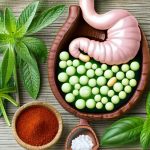The wellness landscape has exploded in recent years, with supplements now ubiquitous in many people’s daily routines. Driven by promises of enhanced energy, improved immunity, and overall well-being, we often add vitamins, minerals, probiotics, and herbal remedies to our diets without fully considering their potential impact on one of the most critical systems within us: our gut. While supplements can certainly play a role in addressing nutritional deficiencies or supporting specific health goals, they aren’t always benign. In fact, for some individuals, seemingly harmless supplements can inadvertently contribute to gut stress, leading to symptoms like bloating, gas, diarrhea, constipation, and even more serious digestive issues. Understanding the complex interplay between supplements and gut health is essential for making informed decisions about what we put into our bodies.
The gut microbiome – a vast ecosystem of trillions of microorganisms residing in our digestive tract – is increasingly recognized as central to overall health. It influences everything from digestion and nutrient absorption to immune function, mental well-being, and chronic disease risk. Introducing new substances, like supplements, can disrupt this delicate balance, potentially triggering inflammation, altering microbial composition, or exacerbating existing sensitivities. This isn’t to say that all supplements are harmful; rather, it highlights the importance of mindful supplementation – one that considers individual needs, potential interactions, and the unique characteristics of each product. A ‘one-size-fits-all’ approach simply doesn’t work when it comes to gut health and supplement use. If stress is contributing to your discomfort, consider how to maintain gut health under pressure.
The Gut-Supplement Connection: Why Things Can Go Wrong
The digestive system is an incredibly complex environment, constantly working to break down food, absorb nutrients, and eliminate waste. Supplements introduce additional compounds that the gut must process. Several factors can contribute to gut stress when supplements are involved. Firstly, many supplements contain fillers, binders, coatings, and other excipients designed for manufacturing or shelf-life purposes. These additives aren’t necessarily beneficial, and some – like certain artificial colors or preservatives – can be irritating to sensitive individuals. Secondly, the form of a supplement matters significantly. For instance, high doses of iron in pill form are notorious for causing constipation, while magnesium oxide (a common laxative) can induce diarrhea.
Beyond additives and forms, the ingredients themselves can pose challenges. Some supplements, like certain herbal remedies or high-dose vitamin C, have inherent properties that can be irritating to the gut lining. Others might directly impact microbial balance. Antibiotics aren’t the only thing that can disrupt the microbiome; even seemingly benign substances can alter its composition if taken in excess or for prolonged periods. Finally, individual sensitivities play a huge role. What one person tolerates easily, another may find highly problematic. Existing digestive conditions like Irritable Bowel Syndrome (IBS), Small Intestinal Bacterial Overgrowth (SIBO), or Inflammatory Bowel Disease (IBD) can further amplify the gut’s sensitivity to supplements. Supplement interactions are also critical to consider. Some supplements can interfere with medication absorption, while others might enhance their effects, potentially leading to adverse reactions. For example, St. John’s Wort – often used for mood support – can interact with a wide range of medications, including antidepressants and birth control pills. This is why it’s so vital to inform your healthcare provider about all supplements you are taking, especially if you are on any prescription medications. It is also important to understand are seed oils linked to gut reactions.
Identifying Supplement-Related Gut Stressors
Pinpointing whether your supplements are contributing to gut stress can be challenging, but several clues can point you in the right direction. The first step is careful observation. Keep a detailed log of your supplement regimen alongside any digestive symptoms you experience. Note when you started taking each supplement, the dosage, and any changes in your gut health – bloating, gas, abdominal pain, diarrhea, constipation, or changes in stool consistency.
- Look for patterns: Do symptoms consistently appear after taking a specific supplement?
- Consider timing: Does the time of day you take supplements matter? (e.g., taking vitamins on an empty stomach)
- Eliminate and reintroduce: This is often the most effective way to identify triggers. Gradually remove one supplement at a time, observing whether your symptoms improve. After a period of elimination, cautiously reintroduce the supplement to see if symptoms return.
It’s important to be patient with this process, as it can take time to accurately assess the impact of each supplement. Don’t attempt self-diagnosis or treatment; instead, collaborate with a healthcare professional who can guide you through the elimination and reintroduction phase. They may also recommend additional testing to rule out other potential causes of your gut issues. Testing might include stool analysis to assess microbial balance, breath tests for SIBO, or food sensitivity testing (though these should be interpreted cautiously). If your gut feels like it’s ballooning, learn why your gut might feel that way after stress.
The Role of Probiotics and Prebiotics
Probiotics – live microorganisms intended to benefit the host – are often marketed as a solution for gut health. While they can be helpful for some individuals, they aren’t always appropriate, and can even exacerbate symptoms in certain cases. Certain probiotic strains might worsen bloating or gas in people with SIBO, while others could trigger histamine intolerance reactions. It’s crucial to choose probiotics carefully, considering your individual needs and sensitivities. A healthcare professional can help you select a strain that is most likely to be beneficial for your specific situation.
Prebiotics – non-digestible fibers that feed the beneficial bacteria in the gut – are also frequently recommended. However, similar to probiotics, prebiotics can cause gas and bloating in some individuals, particularly those with IBS or SIBO. A gradual introduction of prebiotic-rich foods or supplements is usually best, starting with small amounts and monitoring your tolerance. Fermented foods like sauerkraut, kimchi, and yogurt naturally contain both probiotics and prebiotics, offering a more balanced approach to gut support. You might need to train your gut for better tolerance.
Navigating Supplement Quality & Absorption
Supplement quality can significantly impact gut health. The supplement industry isn’t as tightly regulated as the pharmaceutical industry, meaning that product purity, potency, and accuracy of labeling can vary greatly. Look for supplements from reputable brands that undergo third-party testing – organizations like USP, NSF International, or ConsumerLab.com verify that products contain what they claim to and are free from harmful contaminants.
Absorption is also crucial. If your gut isn’t effectively absorbing nutrients from a supplement, it could lead to undigested material fermenting in the colon, causing gas and bloating. Several factors can affect absorption, including:
- Form of the Supplement: Liquid or chewable forms are often easier to digest than pills.
- Timing with Food: Some supplements are best taken with food (to enhance absorption), while others should be taken on an empty stomach.
- Digestive Health: Addressing underlying digestive issues can improve nutrient absorption. For example, if you have low stomach acid production, supplementing with betaine HCl might help improve digestion and absorption.
Ultimately, a holistic approach to gut health is the most effective strategy. This includes a balanced diet rich in whole foods, stress management techniques, adequate sleep, regular exercise, and mindful supplementation guided by a healthcare professional. Focusing on food first – prioritizing nutrient-dense meals over relying solely on supplements – is often the best starting point for supporting optimal gut function and overall well-being. Consider supplements to support gut barrier function as part of your holistic approach, but be mindful of individual sensitivities. And remember, are supplements a risk for sensitive digestion?


















